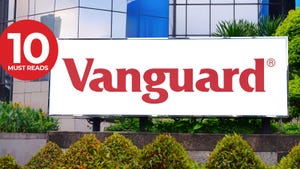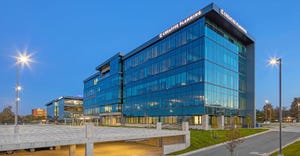How Geopolitics Are Impacting Real Estate DecisionsHow Geopolitics Are Impacting Real Estate Decisions
Newmark’s managing director of geopolitical strategy consulting talks about the risks and opportunities the current economic and political climate brings.
April 5, 2023

The U.S. economy seems to be headed for a slowdown and the recent shake-ups in the banking sector, along with rising interest rates and persistent inflation, have made this a perilous time for commercial real estate investors. Add to these the general sense of unease in the wider global political environment—from the war in Ukraine to U.S. tensions with China to political protests in countries like France and Israel—and we seem to be at a major crossroads where both politics and economics are concerned.
It’s at moments like this that investors should be particularly careful about which business strategies they decide to pursue, carefully weighing potential market risks against opportunities that come with every downturn. That’s where Charlie Smith, managing director of geopolitical strategy consulting at commercial real estate brokerage Newmark, comes in. Smith’s role is to advise clients on political and macroeconomic risk mitigation, while identifying areas of opportunity in the U.S. and abroad.
WMRE recently talked with Smith about the current risk climate when it comes to commercial real estate. His take on the U.S. economy today is that a slowdown is coming, but any recession—if there is one will likely be mild and will provide plenty of opportunities for real estate investors in the global marketplace.
This Q&A has been edited for length, style and clarity.
WMRE: What kind of investors do you work with?
Charlie Smith: I am within the consulting practice and work with Newmark brokers, as well as with direct clients of our own [who] run the gamut from knowledge-specific labor groups to heavy manufacturing. Our clients tend to be companies, generally, they’re medium to large-sized entities. There are lot of manufacturing and food production companies. We work with investors and private equity groups. We work with family offices and institutional investors less so. We are usually working directly with companies and if we work with investment groups, it’s often around their site selection process. We work with location teams, and they tend to go to investment groups and venture capital groups.
WMRE: What are the biggest worries you hear today from investors?
Charlie Smith: More than anything else, it’s general uncertainty. A lot of what I do is reduce some of that uncertainty when it comes to geopolitical events or broader macroeconomic trends we may not think about on a day-to-day basis, but [they] do impact what we do and will have an ongoing impact.
WMRE: What is your outlook for the U.S. economy?
Charlie Smith: I am not a fortune teller, but what I can say is that we are certainly looking at what may turn out to be a slowdown, if not a recession. I’m not concerned if we call it one or the other, but if it’s a recession there’s a belief it won’t be very deep as long as we don’t have any more shocks. Of course, nobody saw the Silicon Valley Bank crisis emerging and no one saw OPEC Plus making their announcement (to reduce the supply of oil).
WMRE: What are your expectations for interest rates?
Charlie Smith: It’s a guessing game, but there's some consensus of [them] peaking between 5.00% and 5.25%. If anything, analysts are saying the peak might be lower than expected because [of] the banking crisis and OPEC Plus decision … The Fed has been clear that inflation is their biggest enemy, but we’re in an environment that might be changing. We’ll know a lot by the end of the second quarter. There’s a lot of uncertainty, but a lot of that will work itself out.
WMRE: Are there opportunities in that setting?
Charlie Smith: There are plenty of risks. We all feel them, but there are always opportunities as well. There are plenty of markets in the U.S. doing quite well and plenty of metro areas in boom times. There are many industries, especially green technology that are doing very well. One thing I point out, especially compared to China, we have a very strong innovation environment, as does Europe. Our plus over Europe is the policy environment has been laid out. It will be there for 10 years when we’re talking about the Inflation Reduction Act—a long enough time frame for investors to feel comfortable jumping into the fray. It’s still fragmented in Europe.
WMRE: What are the specific opportunities tied to that?
Charlie Smith: There’s this new era where the government is playing a much stronger role in the economy. They’ve been pretty hands off for a long time, but we’re getting back to our roots to a certain extent by the government dictating more of that. That particularly applies to the green economy for semiconductors, electric vehicles, batteries and the production of wind turbines and solar panels. There’s plenty of opportunity there. The largest semiconductor manufacturer in the world based in Taiwan is building a facility in Arizona. The CEO said it’s not going to be cheaper to do it here, but for the security of [their] supply chain, it’s critical. Certainly around that advanced manufacturing and electric vehicles, we see the industrial space is looking very strong, and that’s a long term trend, as well as for e-commerce.
WMRE: What about opportunities tied to infrastructure?
Charlie Smith: The Infrastructure Act that Congress passed is around a lot of maintenance that needed to be done, and more than anything, it improved a lot of investor sentiment around the U.S. Externally, you read outside of the U.S. that Congress isn’t able to make decisions, but that’s not true. Those moments do come. There’s a recognition as well for the green economy. A lot of that infrastructure needs to be built out for things like electric vehicles, and the private sector isn’t going to do that itself. There has to be a government nudge if we want to do it quickly.
WMRE: What about defense sector growth?
Charlie Smith: Given the current geopolitical environment, people are keenly aware of that deterrent effect and the practical reality that the U.S. has donated billions of dollars of equipment to Ukraine in its fight against Russia. The defense sector is expected to grow. Certainly, places like Washington, D.C., and installations [in places] like the Virginia Beach area and San Diego—those are not going away and the industries around them continue to grow. Internally, there’s some discussion around what that might look like. The defense sector used to incorporate more things like tech and entrepreneurs and startups into its planning. For those locations with big defense facilities, you could see more of a startup environment to service the defense department.
WMRE: How is all of that impacting your advice to clients?
Charlie Smith: We do see a lot of clients who understand that is a moment and despite some of the economic headwinds—which will be temporary because good times will come again—they know that a lot of investments are very large and that they need to get moving quickly. Despite the 10-year timeframe laid out by the Inflation Reduction Act, 10 years will go by quickly. There’s how many months for planning and building and then, all of a sudden, you’re talking eight years or nine years. You want to take advantage of that as much as possible. There’s a sense of urgency among our clients and there’s an eagerness to work with locations that are able to tack on local incentives, in addition to federal incentives. You’re starting to see clusters emerge, and Arizona is one location, and Michigan and Ohio are attracting a lot [of attention]. The old Rust Belt is coming back, and people want to take advantage of those clusters as they start to emerge.
WMRE: What are some of the opportunities and challenges for investors targeting commercial real estate?
Charlie Smith: There’s a risk around interest rates, but they’re not going to be a permanent situation. We do have some assumptions [that] in 2024 or 2025 interest rates may start to come down. If you want to take advantage of the boom that will happen when they do, start lining those ducks up now because the opportunities will be there. There are always risks in a time of volatility, but there will be plenty of opportunities, especially for investors like family offices or private equity that can be more nimble than institutional investors. It’s important to have flexibility in how you approach commercial real estate.
WMRE: Any commercial real estate opportunities in particular?
Charlie Smith: A few years ago, everybody gave malls up for dead, and now malls are huge. They’re placed in great locations. They often have retail that’s always in demand. I wouldn’t count on the death of any one sector just yet. There’s also great infrastructure around things like office space, where you may have some headwinds compared to other sectors where you can do things like conversions. There are local incentives for that because urban areas have a deep-seated desire to keep these as viable structures. For entrepreneurial thinking, there are a lot of ways to use infrastructure and facilities that we have to plan for the fourth industrial revolution that we’re starting to live through.
WMRE: Any other commercial real estate opportunities?
Charlie Smith: We talk a lot with our clients about nearshoring. When you think about that conceptually, it means this factory in Mexico or Central America makes the goods that come here. But there’s a benefit to nearshoring by having that supply chain closer. When you make something in China, it probably bounces between a few different facilities. When it’s closer to the U.S., those goods can bounce back and forth across our border, so that’s a boost for our infrastructure, supply chain and logistic suppliers as our goods go between here and Mexico or between here and Central America [where] most countries the U.S. has a trade agreement with. There are a lot of domestic benefits for nearshoring beyond having that supply chain security and potential lower costs.
WMRE: Is there something you are advising clients right now to invest in or not invest in based on current trends?
Charlie Smith: I think right now anything that can take advantage of the underlying trends that aren’t going away, like the fluctuation and volatility in energy prices that’s dissuading people from maintaining inefficient structures or investing more into fossil-fuel reliant infrastructure. Anything that can take advantage of facilities that can be rehabbed and be more energy-efficient and take advantage of local incentives to do that in a cost-effective way is an opportunity. Any new structures that are able to take advantage of these incentives to build green and anything that can take advantage of the energy trend anyway you can is going to be something that will pay off in the long run.
WMRE: What final advice do you have?
Charlie Smith: A lot of times commercial real estate is the tip of the spear in the economy. Things start to slow down and feel the headwinds, we start to see it first. On the flip side, we can also be the tip of the spear when things start to go well. That could mean we are at the forefront of recovery when it does happen and will happen. I think it’s important for businesses to keep in mind how to navigate through this current environment to do so in a way to [lay] the groundwork for that new growth when it does come. By having additional information about a lot of markets, you can identify where the bright spots are and where there’s an upswing to take advantage of. Every risk has an opportunity, and it’s important to keep that in mind.
About the Author
You May Also Like





